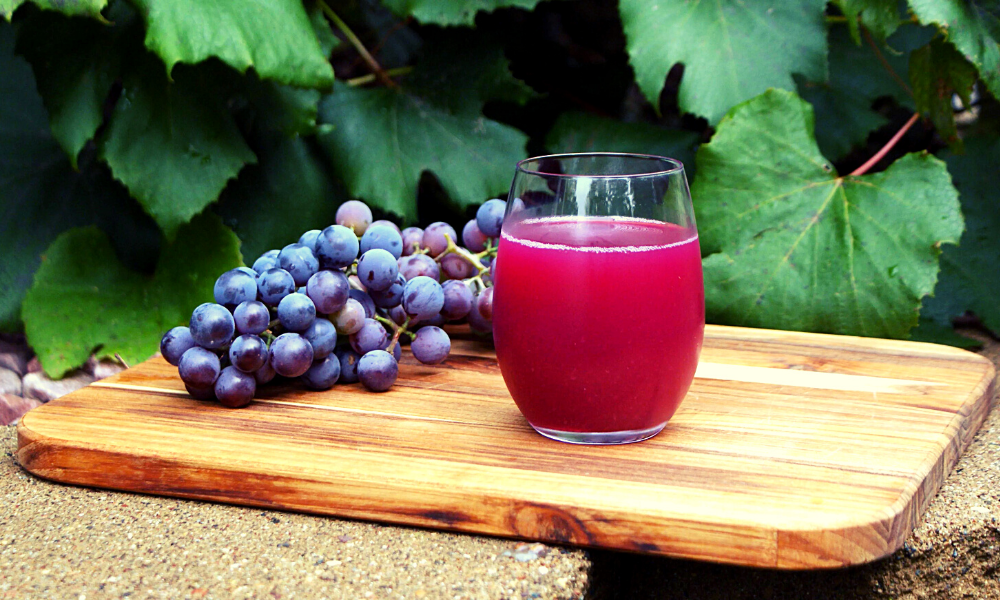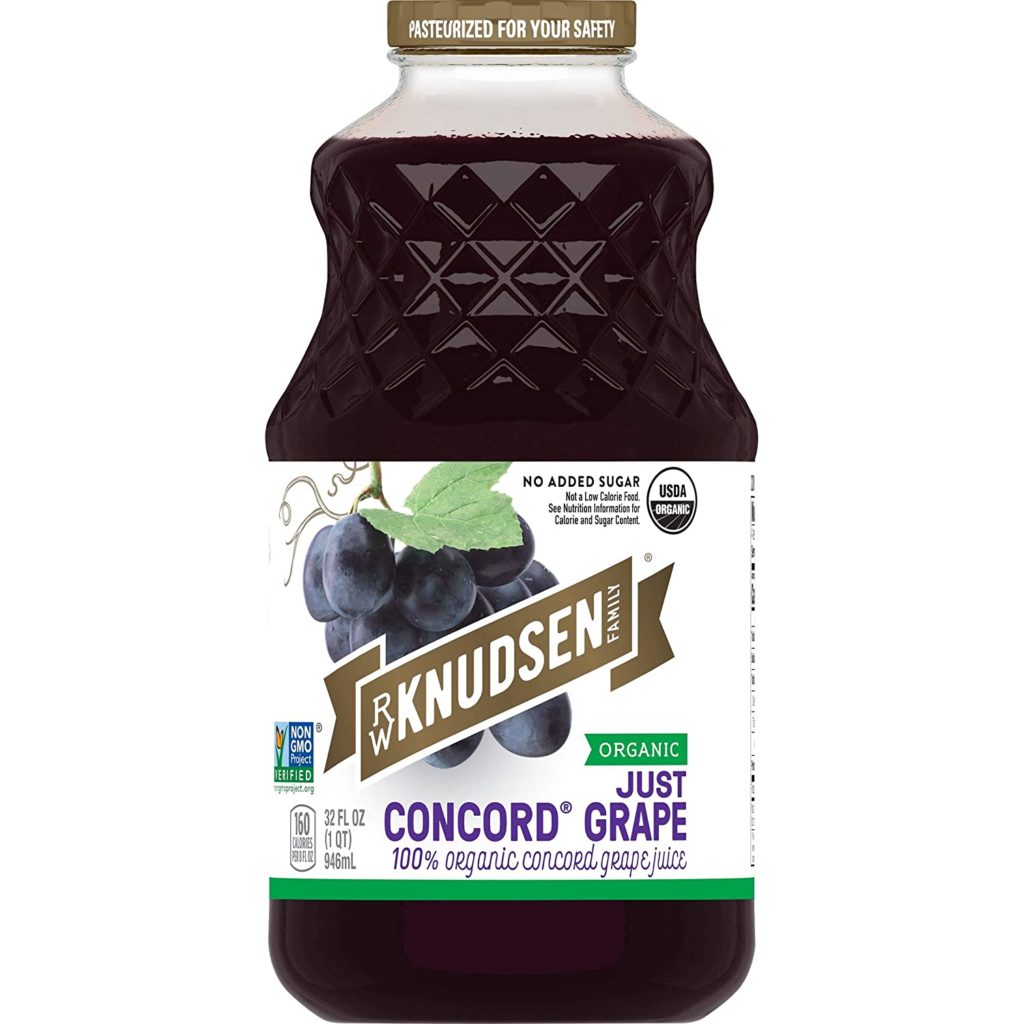Humans have consumed Grapes for millennia. They are simple to grow and make excellent wine, and the fruit can also be dried and stored as raisins. The whole grape, including the skin, flesh, and seeds, is used to make grape juice, and it contains the majority of the vitamins and minerals found in table grapes and the health benefits of nutrient-dense seeds.
Purple grape juice is the most prevalent, made from Concord grapes, and white grape juice prepared from Niagara grapes is also available. Both grape varieties are native to the United States. It’s also a good idea to eat whole grapes, and fresh fruit provides fiber and vitamins.
Grape Juice Nutrition Facts
Here is a table that outlines the nutrition facts for grape juice:
| Nutrient | Amount Per Serving |
| Calories | 150 |
| Total Fat | 0g |
| Saturated Fat | 0g |
| Trans Fat | 0g |
| Cholesterol | 0mg |
| Sodium | 10mg |
| Total Carbohydrate | 38g |
| Dietary Fiber | 0g |
| Total Sugars | 38g |
| Protein | 1g |
| Vitamin D | 0% |
| Calcium | 2% |
| Iron | 4% |
| Potassium | 10% |
You should always check the package for the most up-to-date nutrition information, as the values in this table may vary based on the brand and type of grape juice.
Grape Juice Health Benefits
Grape-flavored drinks may include more sugar and water than fruit juice, resulting in a high-calorie count with few vitamins and minerals. To receive all the health advantages of grape juice without the additional sugars, look for “100% juice” on the label.
Like the fruit from which it is derived, Grape juice is a fat-free and cholesterol-free source of vitamins and minerals, and it’s also a low-sodium beverage.
Disease Risk is Reduced
Grape juice is abundant in antioxidants, which can help the body protect itself from free radicals. Free radicals are hazardous elements found in the environment or processed foods. They can lead to the development of heart disease, cancer, and other disorders by causing harm to cells. Antioxidants may be able to help prevent or even reverse the effects of this damage.
Concord or purple grape juices may be better for lowering illness risk. Concord and purple grapes are naturally greater in antioxidant activity than other grape varietals.
Reference: Concord Grape Juice Supplementation and Neurocognitive Function in Human Aging
Improved Cardiovascular Health
According to preliminary studies, red and purple grape juices may benefit cardiovascular health as red wine does. Protecting blood vessels, lowering the danger of blood clots, and maintaining good blood pressure and cholesterol levels are all advantages of red wine and grape juice.
Blood Pressure Should Be Lower
Grape juice contains potassium, which can assist persons with high blood pressure get rid of extra sodium in their bodies. Potassium can also help to reduce blood pressure by relaxing the blood vessel walls.
Infections of the Urinary Tract Prevention
You may have heard that cranberry juice can help prevent urinary tract infections by fighting bacteria that cause them. Early research suggests that black grape juice may have a similar effect.
Is it Safe to Drink Grape Juice Daily?
Taking grapes or grape juice daily can help improve potassium levels in the body, which will help prevent problems such as heart attacks and loss of muscle mass and bone mineral density, among other things. Why should I limit my intake of grape juice? It’s advisable to limit your grape juice consumption to two to three glasses each day to get the most out of it. Some folks may need to be extra cautious with the beverage and only consume it in small amounts.
Natural sugars, not artificial sweeteners or processed sugar, are found in grape juice. On the other hand, Grape juice has 36 grams of sugar and nearly no fiber, which might cause blood sugar levels to rise. According to decades of research, 100 percent grape juice can promote a healthy heart thanks to the dark purple Concord grape and its polyphenol power. Concord grapes and juice contain many of the same polyphenols and heart-healthy properties as red wine.
Does Grape Juice Cleanse Your Body?
By scavenging free radicals, grape juice can prevent or delay the onset of heart disease, diabetes, obesity, stroke, neurological disorders, and cancer. Grape juice might help you get rid of pollutants if you smoke or live a sedentary lifestyle. As a result, it’s an excellent detox drink. In red and purple grapes, antioxidants help cleanse blood vessels and improve blood flow.
Grape skin and seeds are also beneficial to one’s health. The antioxidant resveratrol in red wine may also be active in grape juice. According to experts, drinking a small glass of pure grape juice before bedtime will help you sleep better and burn fat.
Is Grape Juice a High-sugar Beverage?
Grape juice has a lot of health benefits, but it’s also high in sugar and calories. Some folks may need to be extra cautious with the beverage and only consume it in small amounts. Natural sugars, not artificial sweeteners or processed sugar, are found in grape juice. A cup of grape juice, for example, contains 36 grams of sugar, whereas a cup of grape soda contains 27 grams.
The sugars are natural, but they are processed in the same manner that added sugars in juice are processed,” Siegel explains. According to several studies, red and purple grape juices may have the same heart-healthy benefits as red wine, including lowering the chance of blood clots and Low-density lipoprotein (LDL, or “bad”) cholesterol reduction. Preventing damage to your heart’s blood vessels.
Is Grape Juice Beneficial to the Kidneys?
Grape juice is a diuretic, so it’s great for cleaning out the kidneys and may even aid with kidney stones. Grapes’ high mineral content stimulates the liver’s cleansing action, which aids in detoxification. One of the most dangerous side effects of grapes and raisins is severe renal damage, leading to abrupt kidney failure. The discovery that tartaric acid and potassium bitartrate are only found in high amounts in grapes and that dogs are [members of] a species that has been demonstrated to be.
The lightbulb moment was susceptible to tartaric acid—with acute renal failure described in previous studies. Grape juice is best consumed first thing in the morning, and breakfast can help you increase your insulin sensitivity and blood sugar levels. The body uses sugars for energy more efficiently in the morning.
Is Grape Juice Beneficial to One’s Immune System?
Because grape juice is high in antioxidants, it can help you increase your immunity, and it has antiviral and antibacterial effects. Some health conditions, such as the common cold, cough, flu, and fever, are widespread throughout the winter season, and a healthy immune system can help you avoid specific health problems. Grape juice and wine consumption have been linked to higher anti-inflammatory activity,
lower antioxidant enzyme expression, decreased lipid peroxidation, and reduced cell damage (dos Santos Lacerda et al., 2018., 2015). Grapes and grape juice are beneficial to the liver in numerous animal experiments. According to research, they have provided various health benefits, including reducing inflammation, avoiding damage, and raising antioxidant levels.
Is Welch’s Grape Juice Good for Diabetes?
Grape juice: Compared to orange and apple juice, grape juice has the highest carbohydrates and sugar, making it a good choice for treating low blood sugar. Although grapes contain natural sugar, they have a low glycemic index (GI). A single dish is unlikely to elevate your blood sugar dramatically. Because grapes have a low glycemic index, they can be helpful to people with diabetes.
Diabetics who eat grapes in moderation reap numerous health benefits. Many diabetics label grapes as “sugar bombs” due to the rapid rise in blood sugar levels that even a small amount causes. In this situation, it’s heartening to learn that regular consumption of black grapes may aid in lowering diabetes risk. The reason for this is that eating black grapes improves insulin sensitivity and controls insulin levels. Pterostilbene, a compound discovered in grapes, regulates blood sugar levels.
Grape Juice’s Potential Hazards
Grape juice has a lot of health benefits, but it’s also high in sugar and calories. Some folks may need to be extra cautious with the beverage and only consume it in small amounts.
High Blood Sugar Levels
Natural sugars, not artificial sweeteners or processed sugar, are found in grape juice. On the other hand, Grape juice has 36 grams of sugar and nearly no fiber, which might cause blood sugar levels to rise.
Ask your doctor if you should avoid or reduce your usual serving of fruit juice if you have diabetes or need to monitor your blood sugar. Whole grapes may be preferable because they include fiber and are less likely to trigger blood sugar spikes.
Gaining Weight
When trying to quit drinking soda, grape juice can be a healthier substitute. Fruit juices, high in calories, are easy to overdo, so consider portion size when pouring a glass. According to the American Dietary Guidelines, juice should be limited to a half-cup serving each day.
Conclusion
Grape juice from concentration has had the surplus water removed from the grapes, resulting in a more concentrated juice. This permits the juice to be compressed and frozen, making it easier to package and transport. After that, water is added to the juice before it is sold.
Welch’s, a famous brand of grape juice in the United States, uses entire grape pulp, skin, and seeds. Citric acid is found in small amounts in grapes and can be added for a tart flavor and antioxidant characteristics that prevent oxidation, resulting in longer storage life.



